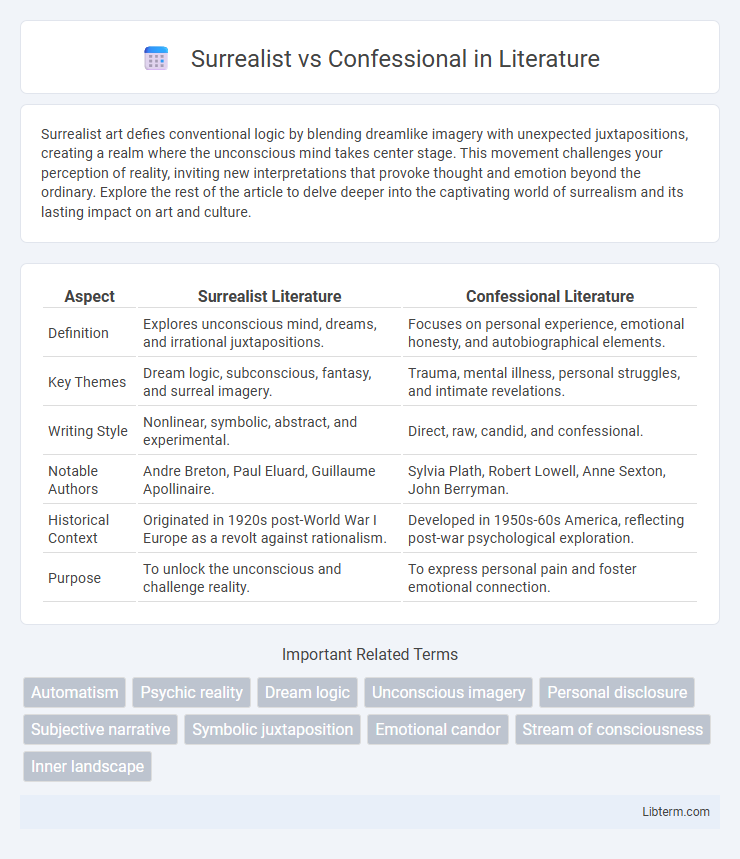Surrealist art defies conventional logic by blending dreamlike imagery with unexpected juxtapositions, creating a realm where the unconscious mind takes center stage. This movement challenges your perception of reality, inviting new interpretations that provoke thought and emotion beyond the ordinary. Explore the rest of the article to delve deeper into the captivating world of surrealism and its lasting impact on art and culture.
Table of Comparison
| Aspect | Surrealist Literature | Confessional Literature |
|---|---|---|
| Definition | Explores unconscious mind, dreams, and irrational juxtapositions. | Focuses on personal experience, emotional honesty, and autobiographical elements. |
| Key Themes | Dream logic, subconscious, fantasy, and surreal imagery. | Trauma, mental illness, personal struggles, and intimate revelations. |
| Writing Style | Nonlinear, symbolic, abstract, and experimental. | Direct, raw, candid, and confessional. |
| Notable Authors | Andre Breton, Paul Eluard, Guillaume Apollinaire. | Sylvia Plath, Robert Lowell, Anne Sexton, John Berryman. |
| Historical Context | Originated in 1920s post-World War I Europe as a revolt against rationalism. | Developed in 1950s-60s America, reflecting post-war psychological exploration. |
| Purpose | To unlock the unconscious and challenge reality. | To express personal pain and foster emotional connection. |
Introduction to Surrealist and Confessional Poetry
Surrealist poetry explores the unconscious mind by employing dreamlike imagery and unexpected juxtapositions to challenge logical reasoning, often inspired by the theories of Freud and the Dada movement. Confessional poetry, emerging prominently in the 1950s and 1960s with poets like Sylvia Plath and Robert Lowell, centers on personal experiences, revealing intimate emotions and autobiographical content. Both movements break conventional poetic forms but diverge in focus, with Surrealism emphasizing the subconscious and Confessionalism prioritizing self-exploration and emotional transparency.
Historical Origins and Influences
Surrealism originated in the early 1920s as a revolutionary artistic and literary movement influenced by Freud's psychoanalysis and Dadaism, emphasizing unconscious mind exploration and dream imagery. Confessional poetry emerged in the 1950s and 1960s, rooted in post-World War II personal trauma and characterized by intimate, autobiographical expression often related to mental health and existential struggles. Key figures like Andre Breton shaped Surrealism, while poets such as Sylvia Plath and Robert Lowell defined the Confessional style through candid emotional disclosure.
Defining Characteristics of Surrealist Poetry
Surrealist poetry is characterized by its emphasis on dreams, subconscious imagery, and unexpected juxtapositions that defy logical reasoning, creating a sense of wonder and chaos. It often utilizes free association, vivid sensory descriptions, and symbolic language to explore deeper psychological truths beyond conscious control. Unlike Confessional poetry, which centers on personal experience and emotional vulnerability, Surrealist poetry seeks to transcend reality through imaginative and illogical expressions.
Key Elements of Confessional Poetry
Confessional poetry centers on deeply personal experiences, marked by themes of trauma, mental illness, and intimate revelations, often employing a candid and autobiographical narrative style. It emphasizes emotional rawness, self-exploration, and confessions of guilt or despair, which contrasts with Surrealism's focus on the unconscious mind and dream-like imagery. Key elements include frank language, direct address, and a focus on the poet's internal life and psychological struggles.
Major Figures in Surrealist Literature
Major figures in Surrealist literature include Andre Breton, who is considered the founder of Surrealism and authored the Surrealist Manifesto, and Louis Aragon, known for his poetic experimentation and revolutionary themes. Salvador Dali, though better known for his visual art, also contributed to Surrealist writing with his vivid and dreamlike prose. Paul Eluard's poetry exemplifies the movement's exploration of the unconscious mind and dream imagery, making these authors central to Surrealist literary expression.
Prominent Voices in Confessional Poetry
Confessional poetry prominently features voices like Sylvia Plath, Anne Sexton, and Robert Lowell, who delve into deeply personal themes such as mental illness, trauma, and familial relationships. Their work contrasts with Surrealist poetry by prioritizing raw emotional honesty and autobiographical detail over dreamlike imagery and subconscious exploration. These poets' candid confessions have profoundly influenced contemporary poetry's approach to vulnerability and introspection.
Thematic Contrasts: Dreams vs. Personal Experience
Surrealist poetry evokes the unconscious mind through dream imagery, emphasizing irrationality and symbolic meaning to explore hidden realities beyond conscious control. Confessional poetry centers on personal experience, revealing intimate emotions and trauma with stark honesty and directness. Thematic contrasts highlight Surrealism's fascination with universal subconscious symbols versus Confessionalism's focus on individual psychological truth.
Language, Imagery, and Technique Comparison
Surrealist poetry employs vivid, dream-like imagery and unconventional language to evoke subconscious thoughts, often using automatism and unexpected juxtapositions. Confessional poetry features intimate, straightforward language and raw, personal imagery that reveals the poet's inner emotional landscape, emphasizing autobiographical elements. Technically, Surrealists favor abstract, non-linear structures, while Confessional poets use more coherent syntax to foster direct emotional connections with readers.
Impact on Modern Literature
Surrealist literature revolutionized modern writing by introducing dream-like imagery and illogical sequences, challenging traditional narrative structures and inspiring experimental techniques. Confessional poetry, with its raw, personal revelations, transformed modern literature by foregrounding emotional honesty and exploring themes of trauma, mental health, and identity. Both movements profoundly influenced contemporary literature through their emphasis on subjective experience and breaking conventional boundaries.
Conclusion: Enduring Legacy and Influence
Surrealism revolutionized art and literature by unlocking the unconscious mind, inspiring avant-garde movements and psychoanalytic explorations for decades. Confessional poetry redefined personal expression through raw, intimate narratives that continue to influence contemporary memoirs and spoken word genres. Both movements leave an enduring legacy by challenging traditional boundaries and deepening the emotional and psychological dimensions of creative work.
Surrealist Infographic

 libterm.com
libterm.com